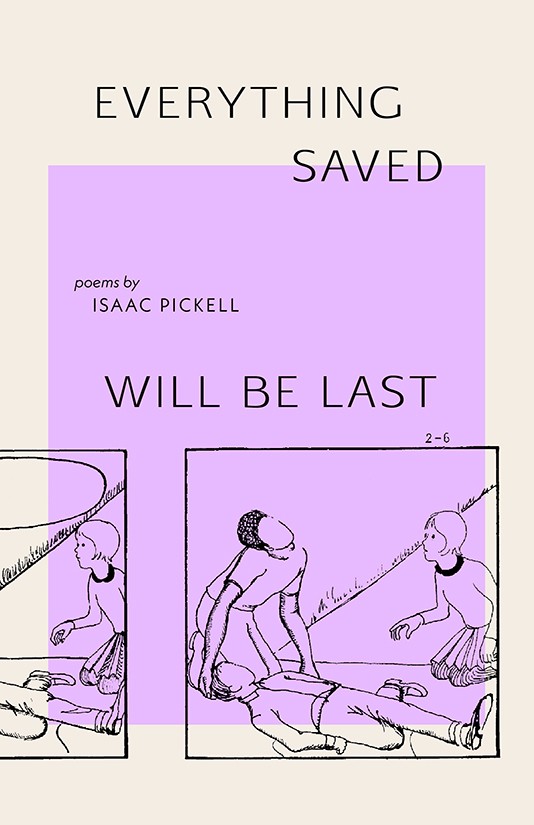Those Who Live in the Between Spaces: everything saved will be last
Isaac Pickell
Black Lawrence Press, 2021
Reviewed by: John Spiegel
The Constant Critic
November 12, 2021
At around 40 pages, Isaac Pickell’s debut chapbook, everything saved will be last, packs a punch despite, perhaps because of, its short length. In his own words, Pickell’s work centers around “the borderlands of blackness.”[1] Through this lens we see harsh views of heavy topics: the systems that led to the current social climate and how we as individuals respond to these systems. In “The stories that (aren’t) told,” the speaker says, “we are / prerecorded bodies / pressed into post- // card and offered / for museum opening / weekends” (17). This blatant honesty and vulnerability in writing gives the work emotional weight. Honestly, any longer of a collection and I would have needed some breathing room.
This may just be semantics, but how we approach poetry, emotionally and physically, can alter how we perceive it. Being a slow reader, longer, 70+ page collections often take multiple sittings for me. I approach the poems with different states of mind and, thus, different perceptions. Call-backs to previous lines/themes/ideas land with less impact because I take more time than was perhaps intended. That being said, time away from the poem gives one the ability to process these complex moves, moves that weren’t intended to be easily digested. Pickell’s work finds a balance where I can read through in one sitting, process, and re-read without feeling overwhelmed by the work in front of me.
Much of this is due to the structure of the chapbook; every handful of pages contains an entirely black page with a small, white-text poem. For example, the chapbook opens with several emotional, lyrical pieces. The poem “imbrute” begins: “I knew I was black when I was / seven-years-old and only knew // because before seven I knew / I was white.” Later in the same piece, the speaker says, “I’ve known / I been good; why do I need // to remember I’ve been black” (4). The following poem, “The future was better before,” continues along the same lines: “When are we gonna get tired / becoming genre and cower // into the helpless terror / of being just one person” (6). Immediately following this, though, is the first black page with white text that reads:
how sweet—to slip
inside of whiteness
To feel nothing &
To still get full
Credit for being alive (7)
It’s these moments of rest that create the cohesive and meditative nature. These lines serve as a counterpoint to the pieces that surround them. They give room for the reader to breathe without truly hitting the brakes. It’s enough of a pause to gain composure while keeping us in the moment.
This juxtaposition flows throughout the text. The text exists in two states, reflecting the dual nature of existence Pickell explores throughout his work. I feel the constant shift between these two planes. This duality is prominent in the poem “on my blue eyes in a hall of mirrors,” a poem dense with contrasting images and descriptions, with a musicality just as concentrated. Constructed as a single sentence, the first several lines read:
“condemned & exalted; tumult &
art; horizon & dancefloor; arrested
& passing; conjured & static; static
& static; unmagic; static &; static &
locomotion; static & arrested; static & refusal” (8)
Single words repeat in varying parts of speech creating momentary pauses, second guesses. Those words are abandoned and revisited later in the poem. One leaves this poem feeling assaulted by the languages as much as graced by them.
These poems ring with a sense of urgency as a result. When the poems don’t eschew formal grammar, the syntax’s curtness and enjambed lines urge the reader forward at a breakneck pace. Commands shout “Locate your darkest relative / in the ground” (11), “fight back” (21), “Forget yellow. / Remember brown” (26), and “if you find / some body missing do not / report to the authorities…do not / present a problem without a solution / because you will get used to it” (34).
These lines are charged with energy; the speaker is at odds with systems of power, as seen in the poem “Without brutalism, what’s left of hope:” “…free // from notions of movement or gravity, habitat / or politics…the structure’s // reach comes from the core / because this is just // what structures do” (28). And yet, the speaker seems just as much at odds with themselves. We feel the tension of dual existence, mixed race identity, not just in how others interact with us, but in how we interact with ourselves, reflecting how “colors // only fade when you are / convinced of such a thing // as original shade” (37). The effect is that we leave feeling as vulnerable as we are angry. The pressure from outside becomes the pressure we place on ourselves.
In this world, one is never truly unburdened. We feel weight pressing in from all around us, even weight we place on ourselves. The closest we come to our true, unburdened self is moments of rest. The final black page reads:
the world really did stop
while you slept, or at least
paused, or at most ceased to be (25)
Pickell’s debut collection is anything but a small work. Aggressive in its goals, everything saved will be last lives in the space between chapbook and full-length manuscript. For those reasons, I’ve begun to think of it not as a chapbook, but as a poetry collection that was designed to be read in one sitting. It carries the tight construction of the former while still developing complex narrative and thematic moves of the latter. everything saved will be last exists in the between spaces while focusing on those who live in the between spaces, and places us squarely between these markers right alongside it.
